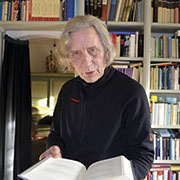At the 2017 Ultraschall Festival Heinz Winbeck’s Fünfte Sinfonie. Jetzt und in der Stunde des Todes [“Fifth Symphony. Now and in the hour of death”] receives its German premiere, given by the Deutsches Symphonie-Orchester under Dennis Russell Davies.
Heinz Winbeck celebrated his 70th birthday on 11 February 2016. His Fifth Symphony is a magnificent essay on Bruckner, following on from his 9th Symphony. The composer wrote an introduction for the work’s premiere in 2011.
Whilst I want to explain to listeners what kind of music to prepare themselves for, I am conscious that no category or terminology, not even an innocuous fragmentary description really applies. Does the detour help the negation?
It is therefore not about a further attempt to “complete” the final movement with the material left by Anton Bruckner, nor is it a neutral musicological study on the basis of this material, and even less is it a transposition into our present day, led by the question of what Father Bruckner would have to say to us today. Well, what is it then?
After several years’ preoccupation with the topic, an awareness crystallised within me about how a composer feels who goes to his death with the burden of this “unfinished” 9th Symphony. He is aware of how his final ideas and visions experience an extreme intensification and at the same time slip away, in the way that collapses occur on land which was previously traversable; about how even familiar and trusted places, whose magnificent peaks we at least wanted to experience from afar suddenly develop into demonic authorities. So we stand alone with our beliefs on shifting ground.
Movement I (“Herr, bleibe bei uns, denn es will Abend werden …”) signals the beginning of farewell, firstly in a very quiet way, feeling its way forward.
Movement II (“Komm, heiliger Geist und entzünde …”) reveals, with a chorale, fugue and main theme, the last great, futile, feverish, staggering exertion.
Movement III (“Jetzt und in der Stunde des Todes”) shows the gradual dissolving of time after the transition through increasing recollections from his own symphonic life’s work, heralded by motifs from the oh-so-revered Wagnerian Götterdämmerung, culminating in a “Hallelujah vision”.
Connoisseurs will note that, although I am constantly dealing with “Brucknerian” material, in fact I almost never quote Brucker in the original – just 4 out of a total of 1,327 bars – and I also avoid an imitation of the Brucknerian orchestral sound as far as possible. And this raises the question about my own part. And here I can only say what seems to me to be a paradox: by study and empathy I have completely subordinated myself to Anton Bruckner, and what has resulted is certainly not “modern” music, but it is absolutely and fully and completely my work and my balancing act. I am happy to present this to Anton Bruckner who would best understand that I have left the final movement unfinished out of respect for his unique individuality and his genius.
Heinz Winbeck
(translation: Elizabeth Robinson)
(from [t]akte 2/2016)



